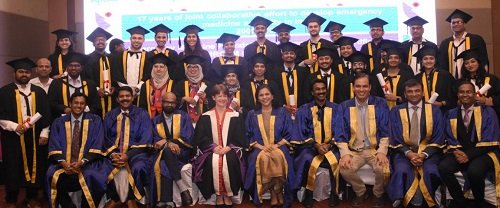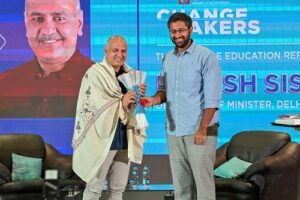
Emergency medicine is indeed the gateway, the critical differentiator for life and death : Dr Sangita Reddy
Hyderabad, April, 2022: Apollo Hospitals and the Royal College of Emergency Medicine (RCEM), United Kingdom held a certification ceremony for doctors who completed their 1 Year and 3 Year training in emergency medicine at various hospitals in India.
MBBS doctors who work full-time in the emergency departments of Apollo Hospitals in Hyderabad, Bangalore, Chennai, Navi Mumbai undergo a highly supervised clinical and academic training of 1 year duration known as Emergency Medicine Foundation Program (EMFP). EMFP trainees and their supervisors are able to record and sign-off skills and competencies on the online NHS Portfolio with RCEM oversight. This portfolio remains as a permanent record of training.
Speaking on the occasion Dr. Katherine Henderson said, it is wonderful to see such inspirational and committed support from Apollo Hospitals, for your career and success of emergency medicine. This is my first international travel since the pandemic impacted the world. This is a program we are very proud off, it’s very very special program, it is giving you clinical and professional skills, which equips you to give effective care in emergency situations in your health systems, that is incredibly powerful, which transforms you to be better doctors and deliver a high standard of care. A structured training program like this gets the best out of you. During the pandemic it was an enormous challenge for the emergency staff all over the world and all of us rose to this challenge in an incredible way. In emergency medicine we are running against time, we have to move on to the next patient, despite not having all the information we need to take decisions, we are really inhibited but are happy to adapt the new technology to ensure the best care for our patients. Congratulations for choosing a career in emergency medicine, do continue to have that fire to do better for our patients.
Dr. Sangita Reddy said, this is a very special occasion to take one step further for a safer country and safer world. You dedicated your lives in the service of humanity by becoming doctors and took one step further and choose emergency medicine as your profession, because it is indeed the gateway, the critical differentiator and quite a significant area. Let me reiterate that we will leave no stone unturned to provide the best care of every speciality and to enhance emergency care. Emergency medicine is not merely a speciality but it is a critical methodology by which you enable so many other specialities to save lives by you keeping the patient alive till speciality care is provided, therefore I commend you, of course for the work you did during Covid, of course for your dedication to medicine and emergency care and commend you in advance for all the lives you will save in future, because touching lives is the greatest opportunity to serve humanity. There is a lot more to be done, at the national level we need to set up emergency rooms on the highways, we need to train to bring in the right protocols so that drones can take lifesaving medicine, defibrillators to the work site, to have our emergency systems in place, need to enhance our training so that our online is far more powerful. We must find ways to bring higher standards of care and use the power of technology, Artificial intelligence to message at the work site, at the point of care. We must connect from our emergency rooms to nursing homes in districts, so that that, single piece of advice can make the difference to life and death.
Dr. K Hari Prasad said, in 1996 our Chairman Dr Prathap Reddy and Ms Sangitha called me to discuss about emergency medicine which was a non-existent speciality in the country at that point of time and was asked to do something about it as many lives were lost on the roads and at home before medical care was accessible to them. At that point of time Emergency care was in the form of causalities, which were more like post offices and the worst doctors in the hospital were posted there, because all that they had to do was to divert the patient to speciality doctors and nothing to do with medical care. We began the journey there, with the vision of our Chairman Dr Reddy and the support of Mrs Sangita Reddy. We could get all the infrastructure for good emergency care, but in no time realised that it’s the man behind to man the emergency room or emergency services made the critical difference, but at that time there was no university in India offering a course in emergency medicine. We had to go the Royal College of General Practitioners and request them to start a program in emergency medicine and that’s how formal training in emergency medicine started off in this country. Since than Apollo Hospitals as a group has trained the largest number of emergency physicians in the country. You were the real frontline warriors during Covid pandemic, you not just had the responsibility of protecting the community, but you also had the responsibility of protecting the hospital staff, besides protecting yourself, as you were the gate keeper for every hospital across the country, you did a marvellous job. Today the country needs a hundred thousand emergency physicians, what we are producing is less than five hundred a year, so we need to bridge this gap.
EMFP trainees can continue further training and gain their Membership of College of Emergency Medicine (MRCEM) which is a recognized postgraduate qualification in the UK, with further opportunities to join higher specialist training in the UK.
68 doctors received their EMFP certification, 26 received their MRCEM and 2 doctors received their Fellowship of the RCEM. Dr. Katherine Henderson, President of the RCEM UK, Dr. K Sangita Reddy, Joint Managing Director of Apollo Hospitals Group and Dr. K Hari Prasad, President – Apollo Group Hospitals, handed over the certificates to the successful doctors.
The EMFP and MRCEM is a joint capacity building effort by the RCEM and Apollo to create high quality emergency physicians who can support and direct hospital emergency care teams.


